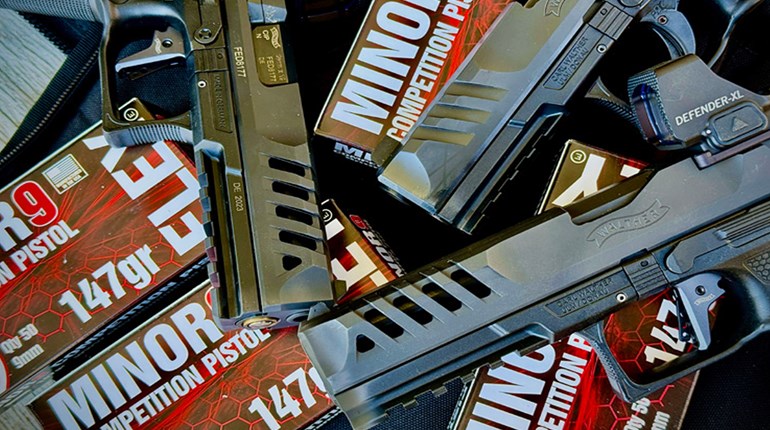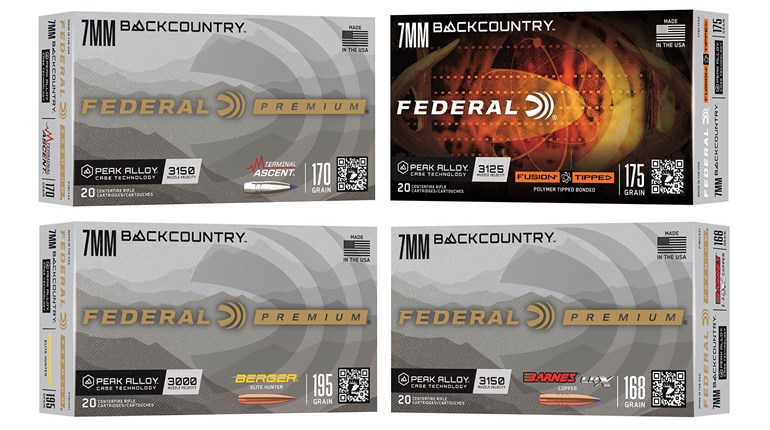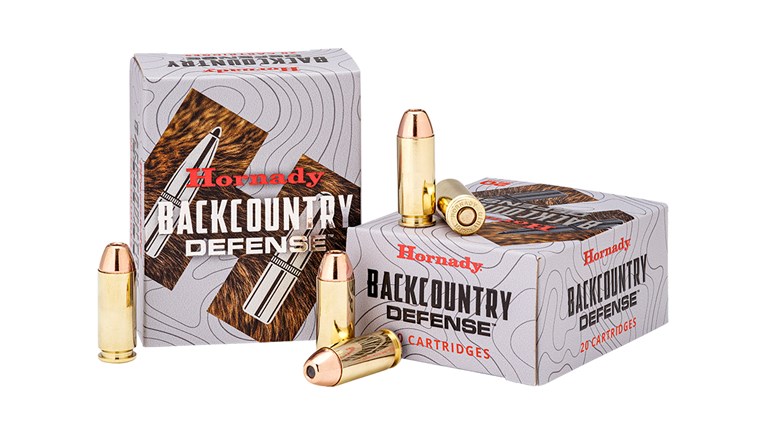
My dad became a life member of the NRA when I was still in diapers, and from the time I can remember, there were several copies of the American Hunter hanging around the house at any given time; in fact, there still are to this day. Ol’ Grumpy Pants had but one big game rifle for decades—a battered Mossberg bolt gun chambered in .308 Winchester—and still uses it with great effect, but the much younger me would pour over those pages and soak it all up like a sponge. Numbers and names, histories and ballistics, and all the subtle details that went along with it mesmerized me, and I probably drove the old man nuts with a thousand questions. I remember reading two words that just seemed so damned cool to me: belted magnum.

Mind you, at the time I hadn’t even fired his .308, but I was undeniable intrigued with it all. I drew a correlation from the lineup of fantastic articles written in the late 70s and early 80s; the belted magnums had more horsepower (and recoil) than did standard cartridges. Plus, that belt of brass just above the extractor groove looked really cool. So, picking Dad’s brain, he explained that the belt gave the case extra strength (sorry Pop, that wasn't correct) and the additional case capacity gave a boost in velocity, which he felt was unnecessary for our neck of the woods. Later in life, when we started to hunt abroad, Dad saw the wisdom of the .300 Winchester Magnum for longer shots on caribou in Quebec, and after that went down the rabbit hole by jumping to the speedy .300 Remington Ultra Magnum.
So, what makes a magnum? Does the magnum cartridge need to be belted? What are the advantages/disadvantages of both designs? Let’s take a look, and hopefully it’ll help you make a more-informed decision.

The word ‘magnum’ is a derivation of the Latin word magnus, meaning ‘great’. In the wine community, it refers to a larger-than-normal bottle size, and in the shooting world it refers to a cartridge which offers an enhanced performance level. In order to give an enhanced performance, one would have to assume that there was some sort of standard benchmark against which the magnum cartridge can be measured. I often wondered why the .416 Rigby wasn’t a magnum, and I assume that because there was no prior standard cartridge in that bore diameter, it defined the standard. Sometimes, I think cartridges based on a magnum case inherit the magnum moniker, such as the case in the .416 Remington Magnum, which is the ballistic twin of the Rigby, but is based on the belted magnum case.
Accordingly, the first belted case was 1905’s .375 Velopex, also known as the .400/375 Belted Nitro Express. If this helped define the performance level of a .375-bore cartridge, it is easy to understand why the 1912 release of the .375 H&H Belted Magnum is a magnum. The belt itself is nothing more than a means of headspacing a cartridge; the belt acts like a small rim, yet the design feeds much easier from a box magazine than does any rimmed cartridge. The .375 H&H, and its younger brother the .300 H&H, each have a relatively large case capacity, and were the perfect platform for wildcatters to use for the development of our most popular magnums, including the .300 Winchester and Weatherby Magnums, 7mm Remington Magnum, .338 Winchester Magnum and .458 Winchester Magnum. The belt is still used for headspacing, though it does pose certain issues.

For the straight-walled cases, like the .458 Winchester Magnum and .458 Lott, it is absolutely necessary, but for those with steeper shoulders, like the .300 Winchester, you’ll notice case stretching after firing, with the shoulder moving forward, expanded to the chamber dimension. Those who reload the bottle-necked belted magnums quite often limit the amount of case resizing, in order to let the cartridge’s shoulder handle the headspacing duties, and an improvement in accuracy due to better concentricity and alignment is often seen. Not that the accuracy from factory ammunition (headspacing on the belt) is terrible, but you can see the case stretch as much as .020 inches. If you only shoot factory ammo, this may not make a bit of difference to you.
The beltless magnums—most of the time based on larger rimless cartridges like the .404 Jeffery—use the shoulder for headspacing, just as the .270 Winchester and .30-06 Springfield do. The .338 Lapua Magnum is based on the .416 Rigby, and the .28 Nosler and .300 Remington Ultra Magnum are based on the .404 Jeffery, as is the old Dakota series of cartridges and (loosely) the Winchester Short Magnum series. This group of cartridges is wonderfully accurate, and give extended case life in comparison to their belted counterparts. While all cases stretch to a certain degree, the belted magnums will—after a number of firings—demonstrate case stretching and even separation just above the belt.

Which design makes the most sense? Well, I've loaded for and hunted with both designs for decades, and I don’t really have a preference. There are those who feel the belted magnum has had its time in the sun, and is destined for obsolescence, but each year sales of the 7mm Remington Magnum, .300 Winchester Magnum and .375 H&H Magnum hold steady. Having had two decades to unseat the .300 Winchester Magnum, I don’t see the .300 Winchester Short Magnum selling better than its belted cousin. But, the beltless 6.5 PRC (giving magnum performance in spite of its name) is gaining a head of steam among hunters and long-range shooters alike.
Despite being 109 years old, the .375 H&H Belted Magnum isn’t going anywhere, despite the .375 Ruger’s beltless case and identical ballistics. And though I feel it is slightly overbore and inefficient compared to the .280 Ackley Improved, there will be a ton of 7mm Remington Magnum rifles headed afield this fall, and the next, and the next. Let’s settle the debate like this: if you don’t handload your ammo, it probably doesn’t matter whether or not your cartridge has a belt. If you do, and case life is important to you, opt for the beltless magnum designs. Personally, I’ll happily be using both.
Want to read more from Philip Massaro? Check out the following articles:
• Review: Leupold VX-3HD 4.5-14x40mm
• The Effects of Barrel Length on Your Rifle
• The Effects of Bullet Shape at Hunting Ranges
• Best Shooting Rests for Hunters
• 5 Reasons to Learn How to Reload Ammunition
• Why Every Hunter Should Own a Rifle in a Common Caliber
• An Ode to the .375 H&H Magnum
• An Ode to the Winchester Model 1886
• An Ode to the Winchester Model 70
• 6 Ways to Fine-Tune Your Hunting Rifle
• Review: Heym Model 26B Double Rifle .45-70
• 5 Reasons the .300 Win. Mag. Rules the Roost
• Bolt-Action Rifles: Push-Feed vs. Controlled-Round-Feed
• Scope Magnification: How Much is Too Much?
• A Hunter's Guide to Staying Sane During the Coronavirus Outbreak
• Is Walnut Dead? Synthetic vs. Wood Stocks
• Rifles for the Traveling Hunter
• Top 5 Lever-Action Rifle Cartridges
• African Game Meat: What Happens After the Shot?
• Top 5 Underrated Deer Cartridges
• Top 5 Double Rifle Cartridges
• Deer Hunting: Were the Good Old Days Really That Good?
• Essential Gear for the Traveling Hunter
• 4 Reasons to Hate the 6.5 Creedmoor
• 4 Ways to Fine-Tune Your Rifle During the Off Season
• Review: Savage Model 110 AccuFit System
• Top 8 Bullets for African Plains Game
• Review: Tikka T3X Lite
• Top Bear Rifles and Loads
• 3 Rifle Cartridges to Hunt the World
• Why My Cartridge is Better Than Yours
• Top 5 Handgun Hunting Cartridges
• An Ode to the Ruger Model 77
• Top 5 Hunting Cartridges of the 21st Century
• Top 5 Deer Bullets for 2018
• An Ode to the .30-30 Winchester
• 5 Reasons to Book a Spring Bear Hunt
• An Ode to the Ruger Mini Thirty
• Boattail vs. Flat-Base Bullets
• How to Build a Custom Rifle
• Choosing a Cartridge for North America's Big Game
• Top 5 American-Made Hunting Rifles
• How to Choose a Buffalo Rifle
• An Ode to the .223 Remington
• Top 5 Coyote Cartridges
• The Ultimate Long-Range Hunting Cartridge
• The Greatest Whitetail Cartridge Ever Designed
• An Ode to the Browning BAR
• Top 5 Bear Bullets
• Do You Really Need a Magnum Cartridge?
• Why the Ruger No. 1 is Not No. 2
• Top 10 Mythical Game Species
• Top 5 Monometal Soft-Point Bullets
• Top 5 Subsonic .22 Long Rifle Loads
• The Most American Rifle Cartridge
• Tips for the Traveling Hunter
• How to Choose a Gun Safe
• Best Gun Cases for the Traveling Hunter
• An Ode to the .30-06 Springfield
• Top 5 Boutique Bullet Companies
• Top 5 .22 Long Rifle Loads
• 5 Reasons Round-Nose Bullets Are Still Cool
• Top 5 Dangerous Game Loads
• Top 5 Turkey Loads
• 5 Rifle Cartridges That Need to Make a Comeback
• Top 5 Safari Calibers
• 5 New Year's Resolutions for Hunters
• What Your Favorite Rifle Cartridge Says About You
• America's Most Wanted Cartridges
• America's Strangest Game Laws
• What Your Favorite Rifle Cartridge Says About You, Part II
• Top 5 Overrated Rifle Cartridges
• Top 5 Underrated Rifle Cartridges
• 5 Reasons to Handload Your Ammunition
• 5 Cartridges You Might Not Know About
• Top 5 Wildcat Cartridges
• An Ode to the Ruger Mini-14
• Top 5 Hog Loads
• Why .30-30 Winchester Will Never Die



































